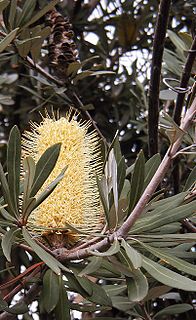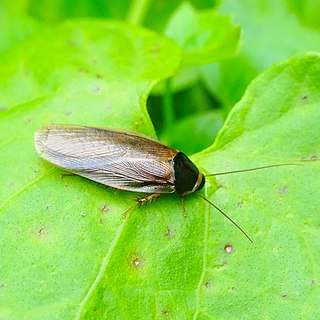
Celtis is a genus of about 60–70 species of deciduous trees, commonly known as hackberries or nettle trees, widespread in warm temperate regions of the Northern Hemisphere. The genus is part of the extended hemp family (Cannabaceae).

Banksia conferta, commonly known as the glasshouse banksia, is a species of shrub that is endemic to eastern Australia. It has rough, bark on the trunk, elliptic to egg-shaped leaves arranged in whorls, crowded yellow flowers in a cylindrical spike later forming a relatively large number of follicles.

Banksia ser. Salicinae is a valid botanic name for a series of Banksia. First published by Carl Meissner in 1856, the name has had three circumscriptions.

Alex George's taxonomic arrangement of Banksia was the first modern-day arrangement for that genus. First published in 1981 in the classic monograph The genus Banksia L.f. (Proteaceae), it superseded the arrangement of George Bentham, which had stood for over a hundred years. It was overturned in 1996 by Kevin Thiele and Pauline Ladiges, but restored by George in 1999. A recent publication by Austin Mast and Kevin Thiele suggests that it will soon be overturned again.

Nepita is a monotypic moth genus in the subfamily Arctiinae erected by Frederic Moore in 1860. Its only species, Nepita conferta, the footman moth, was first described by Francis Walker in 1854. It is found in India and Sri Lanka.

Juniperus conferta is a species of juniper, native to Japan, where it grows on sand dunes. It is often treated as a variety or subspecies of Juniperus rigida.

Ophraella notata is a species of skeletonizing leaf beetle in the family Chrysomelidae.
Ophraella bilineata is a species of skeletonizing leaf beetle in the family Chrysomelidae. It is found in North America.

Ophraella sexvittata is a species of skeletonizing leaf beetle in the family Chrysomelidae. It is found in North America.

Ophraella notulata is a species of skeletonizing leaf beetle in the family Chrysomelidae. It is found in Central America and North America.
Larropsis is a genus of square-headed wasps in the family Crabronidae. There are more than 40 described species in Larropsis.
Ophraella californiana is a species of skeletonizing leaf beetle in the family Chrysomelidae. It is found in North America.
Ophraella cribrata is a species of skeletonizing leaf beetle in the family Chrysomelidae.
Ophraella americana is a species of skeletonizing leaf beetle in the family Chrysomelidae. It is found in North America.
Aegialia conferta is a species of aphodiine dung beetle in the family Scarabaeidae. It is found in North America.

Epicauta conferta is a species of blister beetle in the family Meloidae. It is found in Central America and North America.
Ophraella slobodkini is a species of skeletonizing leaf beetle in the family Chrysomelidae. It is found in North America.

Acacia conferta, commonly known as crowded-leaf wattle, is a shrub belonging to the genus Acacia and the subgenus Phyllodineae that is endemic to eastern Australia.
Eucalyptus conferta is a rare, slender tree that is endemic to a small area near Chewton, Victoria in Australia. It has thick, rough, fissured bark, dull green to bluish, lance-shaped adult leaves, flower buds arranged in groups of seven, white flowers and hemispherical fruit.

Pycnoscelus is a genus of cockroaches in the family Blaberidae. There are about 15 described species in the genus Pycnoscelus.











